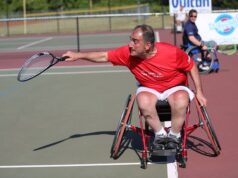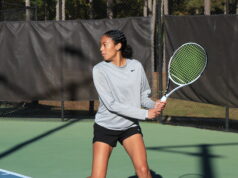By Allison Cochran PA-C, MPAS, New Vitality Medical
So, what is advanced preventative sports medicine? The short answer: It is the prevention of sports-related injuries. Medically speaking, it is the early detection, prevention and treatment of aging-related diseases with a focus on preserving optimum human function through established protocols that supplement our body’s depleting vitamin, mineral and hormone production.
Imagine eliminating tennis elbow, stress fractures in the back, jumper’s knee (patellar tendinitis), rolled and sprained ankles, sprained wrists, rotator cuff tears, stress fractures, bruised heals, tendonitis and broken bones. You may be asking yourself if this is possible. The short answer is yes, but let’s look at how this is achievable.
Rewind to 1992. It wasn’t that long ago that doctors would sit/wait for things to break and then fix the injury. After realizing how archaic this practice was, medical professionals started to change the paradigm. They asked: What if prevention was inserted into the medical model? These discussions led to a new specialty in medicine – a practical medicine, preventive in nature. Starting with 12 doctors, 35 participants and two display booths, advanced preventative medicine was born under the name “The American Academy of Antiaging Medicine” (A4M).
Fast forward to 2019. Doctors agree the future of healthcare is in the field of advanced preventative medicine, sometimes called “anti-aging medicine.” Today, A4M has more than 26,000 members in over 120 nations who work through programs in Olympic sports and in prominent medical universities worldwide. A4M-certified doctors deal with the highest level of governments in the United States, China, India, Southeast Asia, Indonesia and Australia in promoting athletic advanced preventative medical programs for top athletes. These physicians and other medical professionals set out to become the best in their field; they’re no longer satisfied with leaving medicine broken as it was. They’re learning that as we age, we produce fewer hormones and absorb less of the vitamins and minerals we ingest. The result is a weaker body that is more susceptible to sports-related injuries. So, what are the early warning signs?
Why suffer needlessly?
A leading hormone expert and urologist from Harvard Medical School, Dr. Abraham Morgentaler, who wrote the book “Testosterone for Life,” reported men with low testosterone die earlier than those with normal testosterone. Dr. Morgentaler is a strong advocate that men should age with a healthy level of hormone, and he thinks too many people suffer needlessly.
Dr. Sara Gottfried, a gynecologist, author and owner of the Gottfried Institute in Berkeley, California, states women are on a hormonal roller coaster most of their adult life and don’t need to be. “Hormones are chemical messages, like text messages, sent from an endocrine gland through your body to target cells. Hormones influence your behavior, emotions, brain chemicals, immunity and metabolism,” she said. “When your hormones are in balance, you look and feel your best, but when they are imbalanced, they can make your life miserable.”
Supplement or suffer
Many people have long believed that hormone levels decline as a natural result of aging, therefore, there is nothing we can or should do about it. That’s like telling a middle-aged person that since vision typically deteriorates with age, there’s no point in prescribing glasses – or we shouldn’t treat atherosclerosis to prevent heart attacks because it, too, is an age-related phenomenon. That just doesn’t make sense.
Advanced Preventative Medicine – No harm in trying
Unlike previous conventional hormone treatments, bioidentical hormones are biologically identical to those produced by your body, providing for safe and optimal balancing. These hormones are derived from plant estrogens that are chemically identical to those the human body produces. Estrogen, progesterone and testosterone are among those most commonly replicated and used in treatment. Dr. Gottfried says that one-size-fits-all hormone therapy is obsolete medicine. The truth is: Bioidentical hormones are a godsend for some people and inappropriate for others. There’s no harm in trying a small amount of bioidentical hormone replacement to see if it’s right for you. Your body will either say yes or no quickly.
Sources: opening remarks 2018 A4M Las Vegas, R. Goldman, MD & R. Klatz, MD; “Testosterone for Life,” Dr. Morgentaler; “Younger & The Hormone Cure,” Dr. Sara Gottfried.
———–
DECLINE AFFECTS BOTH MEN AND WOMEN
Early signs for women
- Weight gain – changes in hormone balance allow for a buildup of stubborn fat
- Loss of estrogen causes decreased bone density and hot flashes
- Weaker strength – building and maintaining muscle suddenly becomes difficult
- Mood changes – hormone imbalances lead to irritability, depression, anxiety and brain fog
- Fatigue – declining energy and stamina level
- Noticing declining libido
Early signs for men
Male testosterone levels peak in early adulthood, then men lose about 1 percent per year starting in their early 30s.
- Decreased strength
- Decreased energy and stamina
- Decreased ability to maintain and build muscle
- Weight gain
- Difficulty sleeping
- Noticing declining libido and sexual function
- Bone density loss – more susceptible to fractures and breaks
- Mood changes




